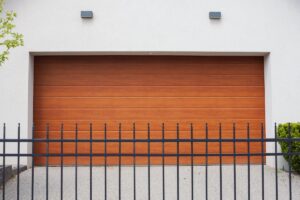What Materials Can You Use For A Garage Door?
A garage door is an essential part of any home or business space. Not only does it provide security and protection, but it can also enhance the overall look of the building. When choosing a garage door, one important consideration is the material used in its construction. Here we explore the most common materials used for garage doors and their advantages and disadvantages.

Steel Garage Doors
Steel is perhaps the most popular material for garage doors, accounting for over 70% market share globally. Its popularity stems from its durability, versatility, and relatively low cost. It can withstand harsh weather conditions without rusting or warping, and is available in a variety of colors and finishes. Steel doors are energy-efficient, as they feature insulation that helps minimize heat loss and keep energy bills low. Despite its benefits, some drawbacks to steel doors may include the potential for dents and scratches, which may require costly repairs, and the fact that they can be prone to corrosion over time.
Wood Garage Doors
Wood has been a traditional garage door material for decades and is often the go-to choice for traditional or classic architectural styles. Wood is prized for its natural beauty, longevity (it can last for up to 25 years or more with proper maintenance), and customizable designs. Wood doors can be painted or stained with a variety of finishes, which can help protect them from the elements.
However, wood doors require routine maintenance such as repainting or staining every few years, are prone to warping and cracking when exposed to moisture, and can be more expensive than other materials.
Aluminum Garage Doors
Aluminum is a lightweight and low-maintenance garage door material. It is rust-resistant, making it ideal for areas with heavy rainfall or saltwater exposure. It is also affordable and commonly used in contemporary or modern-style homes. Aluminum doors are easy to handle since they are lightweight, and they can be easily automated for added convenience.
But one potential issue with aluminum doors is their susceptibility to dents and damage from impacts. They also tend to be less energy-efficient than other materials, so they might not be the best option in areas with extreme weather conditions.
Fiberglass Garage Doors
Fiberglass is a relatively new garage door material and is quickly gaining popularity due to its durability and low maintenance requirements. It can resist dents, scratches, and moisture damage, making it ideal for coastal or wet climates. Fiberglass doors can also be painted or stained and come in a variety of textures and finishes.
One potential issue with fiberglass doors is their tendency to expand and contract in extreme weather conditions, which can cause warping or bowing over time. They are also more expensive than some other materials, such as steel or aluminum.
Vinyl Garage Doors
Another material option for garage doors is vinyl. Vinyl doors provide excellent durability and resistance to dents, rust, and scratches. They are also low-maintenance and do not require regular painting or staining. Vinyl doors are available in various styles, colors, and finishes, allowing homeowners to choose one that matches their aesthetic preferences.
One notable advantage of vinyl doors is their excellent insulation properties, which can help improve energy efficiency and reduce noise transmission. They can also withstand harsh weather conditions, making them suitable for both hot and cold climates. However, it’s important to note that vinyl doors can fade over time due to prolonged exposure to sunlight.
Composites Garage Doors
Composite garage doors combine different materials to create a robust and durable product. Commonly, composites consist of a combination of wood fibers and recycled materials, such as plastics. These doors are known for their strength, resistance to warping, and low maintenance requirements. They can be designed to mimic the appearance of wood without the associated drawbacks, such as susceptibility to moisture damage or the need for regular refinishing.
While composite doors offer numerous benefits, they can be more expensive than other materials such as steel or aluminum. Additionally, the availability of composite doors may vary in certain regions.
How to Pick the Right Material for Your Garage Door
It is important to consider different perspectives when choosing the material for a garage door. Here are some key factors to consider when making this important decision:
1. Budget
Start by setting a budget for your garage door project. Different materials come with varying price tags. Wood and custom designs tend to be more expensive, while steel and aluminum are often more budget-friendly. Knowing your budget will help you narrow down your options.
2. Aesthetic Appeal
Consider the overall look of your home and how the garage door will fit in. The garage door should complement your home’s architectural style. Wood doors offer a classic, timeless look, while steel and aluminum doors provide a more modern appearance. Choose a material that enhances your home’s curb appeal.
3. Durability and Maintenance
Think about how much maintenance you’re willing to undertake. Wood doors may require regular painting or staining to prevent rot and maintain their appearance. On the other hand, steel and aluminum doors are low-maintenance and resist rust and corrosion. Vinyl doors are also durable and require minimal upkeep.
4. Insulation
Consider the insulation properties of the garage door material. If you use your garage as a living space or have rooms adjacent to it, insulation is crucial. Insulated steel and vinyl doors offer excellent energy efficiency, helping to regulate the temperature inside the garage.
5. Security
Security is paramount for your garage. Steel garage doors are known for their strength and security features. They provide added protection against intruders. If security is a top concern, opt for a material that offers enhanced security features.
6. Climate Considerations
Take your local climate into account when choosing a garage door material. Wood doors may not fare well in humid climates, while aluminum and fiberglass are corrosion-resistant and suitable for coastal regions. Ensure the material can withstand the weather conditions in your area.
7. Noise Level
Consider how noisy the garage door material is during operation. Wooden doors can be louder than steel or aluminum doors. If noise is a concern, look for a quieter garage door opener or opt for a quieter material.
8. Customization Options
If you want a unique design or color for your garage door, explore the customization options available for different materials. Wood doors can be easily customized with various stains and paints, while steel and aluminum doors offer a range of color choices.
9. Longevity
Think about the lifespan of the garage door material. While wood doors can be durable with proper maintenance, steel, aluminum, and vinyl doors often have longer lifespans and may come with warranties.

Frequently Asked Questions (FAQs)
Q: Are wooden garage doors a good choice for a humid climate?
A: Wooden doors may require more maintenance in humid climates to prevent warping and rotting. Consider the climate when choosing wood.
Q: Can I paint or stain a steel garage door to match my home?
A: Yes, steel doors can be painted or stained to achieve the desired look to match your home.
Q: Which garage door material offers the best insulation?
A: Vinyl and insulated steel doors are known for their excellent insulation properties.
Q: Are fiberglass garage doors suitable for coastal areas?
A: Yes, fiberglass doors are resistant to corrosion, making them a good choice for coastal regions.
Q: Do aluminum garage doors dent easily?
A: Aluminum doors can dent if subjected to significant force, so it’s essential to be cautious.
Q: What is the average lifespan of a vinyl garage door?
A: With proper maintenance, vinyl garage doors can last for many years, often exceeding 20 years.
Conclusion
Selecting the right material for a garage door is a crucial decision. Each material has its own advantages and disadvantages, and homeowners must assess their specific needs and priorities. Steel doors offer durability and versatility, wood doors evoke a timeless charm but require regular maintenance, aluminum doors are lightweight and affordable, fiberglass doors provide durability with low maintenance, vinyl doors offer excellent insulation and resistance to damage, and composite doors combine various materials for strength and aesthetics.
